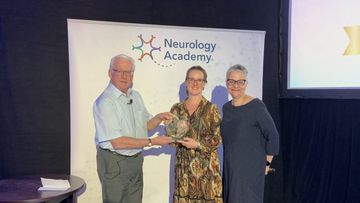Improving outcomes for inpatients with Parkinson’s by reducing medical error
The soon to be updated 2006 NICE guidelines for Parkinson’s disease (PD) offer comprehensive advice regarding best practice for management of inpatients with Parkinson’s.[1] Most importantly the guidance states that Parkinson’s drugs should not be changed suddenly or withdrawn abruptly on admission to hospital. The majority of hospital patients with PD are clerked in by doctors of grades FY1 to ST1 who may not have had practical experience of managing such patients. Recent audits have shown that even though the ‘get it on time’ message has been widely publicised for over a decade errors still occur in upward of 50% of PD inpatients.[2]
Aim
The aim of the programme was to take a combined approach to education for junior doctors FY1 through to ST2 combined with the roll out of a new universal drug chart acceptable for prescribing PD medications.
Method
Two 60-minute teaching sessions were delivered to each group preceded and followed by a single best answer MCQ paper to monitor improvement in knowledge base. Teaching was delivered in an open style seminar format to cater for the different knowledge base of the two groups (FYs and SHOs). The post-MCQ paper was taken 2-6 weeks after the end of the taught component to see if knowledge was retained. To allow the pre- and post-teaching MCQs to be able to track educational attainment each individual received a random 15 of 30 questions in Paper 1 and then completed the remaining 15 in Paper 2. Individual questions could then be compared before and after to see if there was improvement in correct responses. In addition to the taught components there was a prescribing workshop utilising the soon to be rolled out universal drug chart. This chart had 8 possible time points for prescribing each drug which rendered the old PD prescription chart obsolete. There were also separate boxes for patches to ensure compliance with specific prescribing practices for this group of medicines.
RESULTS
Pre and Post MCQ papers
Scores improved by 18% following the taught component from 9.4/15 to 12.1/15. Improvements were seen in 23 out of 30 questions. One question showed no change as it was answered correctly 100% of the time. Six questions showed deterioration following the taught component.
DISCUSSION
Delivery of 2 hours of teaching and prescribing workshops improves knowledge of PD and its management in inpatients by a significant margin. It can be extrapolated that this as well as the changes to the prescription chart will reduce medical error in inpatients with PD.
The majority of practical questions showed sustained improvement in correct responses. Interestingly, of the questions where scores deteriorated the topics examined were mainly around basic science or epidemiology. These did not feature prominently on the taught component or workshops but highlight that constant reinforcement of basic principles is necessary to retain such knowledge.
ACTIONS & RECOMMENDATIONS
- Regularise the taught components on the FY and SHO teaching curricula
- Continue improvements to universal inpatient drug chart
- Direct link on intranet now available to the OPTIMAL PD drug calculator
REFERENCES
- Parkinson’s disease – Diagnosis and management in primary and secondary care, NICE clinical guideline 35, 2006
- “Get it on Time” and falls prevention strategy in Parkinson’s clinic, Dr Sudarshanie Palliyage, Advanced Parkinson’s Masterclass 29, 2016
More Parkinson's Academy Inpatient care Projects

'The things you can't get from the books'
Parkinson's Academy, our original and longest running Academy, houses 23 years of inspirational projects, resources, and evidence for improving outcomes for people with Parkinson's. The Academy has a truly collegiate feel and prides itself on delivering 'the things you can't get from books' - a practical learning model which inspires all Neurology Academy courses.